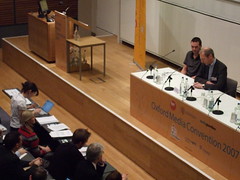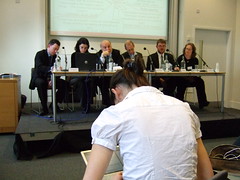Lisp is one of the oldest and best-loved programming languages around, but it gets relatively little attention from programmers despite its flexibility and power. Now the organisers of the 2007 International Lisp Conference hope to raise the language’s profile by inviting entries for their latest programming contest.
Time for digital literacy
[Also available on the BBC News website]
A senior manager at lottery operator Camelot has discovered that adopting different online identities is not as straightforward as it might appear, and it seems to have cost her her job.
The contract to run the UK national lottery comes up for renewal in 2009, and Camelot is obviously very interested in the competition.
Continue reading “Time for digital literacy”
Learning from the locals
[As ever, you can read this on the BBC News website, and it was also picked up by Charles Johnson on lgf]
The students in my online journalism class at City University this year must be wondering whether they have made the right choice.
Getting a professional qualification in journalism, with its shorthand classes, endless lectures on ethics and numerous assignments designed to hone students’ reporting skills, may well look like too much effort in the world of citizen journalism.
Continue reading “Learning from the locals”
Oxford Media Convention
Still working hard…
Oxford Media Convention
In the session discussing news online, and The Guardian’s Jemima Kiss is working hard at the front of the room for Organ Grinder
The fragile network
[As ever, you can also read this on the BBC News website. (28/1/07 – it was also picked up by CircleID]
One of the more persistent founding myths around the internet is that it was designed to be able to withstand a nuclear war, built by the US military to ensure that even after the bombs had fallen there would still be communications between surviving military bases.
Continue reading “The fragile network”
A new you?
[As ever you can read this on the BBC News website]
A business user who forgot the password for their account on the corporate network would probably get a withering look from the IT department as they grovelled to have it reset, but it seems that young people who forget their MySpace logins are just as likely to make a new account as fret over their lost friends or painstakingly constructed homepage decorations.
Living in the wired world
[As ever, you can read a slightly shorter version of this on the BBC News website]
Anyone who has been online for some years, as I have been, should have felt remarkably smug this year as the Internet and all of its associated technologies, services, protocols and applications went mainstream.
The change was clear in the media, where stories about Web 2.0 startups, Google’s machinations, the imminent consumer launch of Vista and the importance of Wikipedia made the main news pages of the papers, featured in magazines and were covered extensively on radio and television.
Continue reading “Living in the wired world”
Merry Christmas
Sitting talking to Anne at home last night when Lili took this…
Welcome to the new economy…
This year there has been remarkably little fuss made over the continued growth of online shopping for Christmas presents, perhaps because we’ve finally reached the point where it is just a normal part of our lives.
After years of effusive headlines – the BBC had ‘Internet shopping set for new record’ in December 2002, and ‘E-Commerce set for Xmas bonanza’ in 2003 – we seem finally to have accepted that the network is here to stay and settled down to use it.



